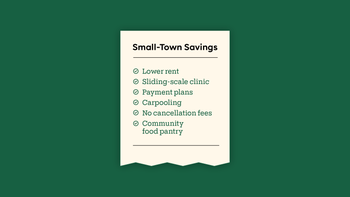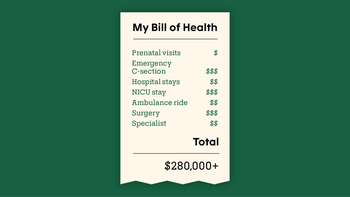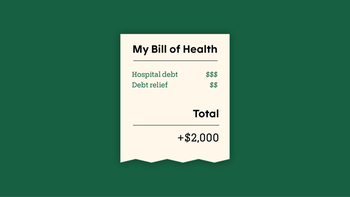
Should You Consolidate Your Medical Debt?
Key takeaways:
Medical debt consolidation typically involves taking out a loan to pay off medical debts.
Consolidation can involve securing a personal loan, a 401(k) loan, a home equity line of credit, or a new credit card.
In all likelihood, you will be charged interest on the loan. A high credit score may help you find a lower interest rate on a personal loan or credit card, but there are also advantages to using a home equity line of credit or a 401(k) loan.
Table of contents

Medical debt consolidation is when you combine multiple healthcare bills, usually in order to settle those debts and make one monthly payment instead of several. A medical debt consolidation can be done by securing a personal loan, a 401(k) loan, a home equity line of credit, or a credit card.
Debt consolidation may be an option for you if you have a good credit score but have medical bills that you cannot afford to pay off at the moment. Medical debt consolidation is not a one-size-fits-all solution, and there are both advantages and disadvantages to consider. An advantage of combining your medical debt is that rather than having to pay off individual medical bills immediately, you instead can make monthly payments on the consolidated loan. You also will have more time to pay the new debt. Combining medical debt can help you avoid having bills go into collections, which can prevent lawsuits and bankruptcy.
One disadvantage is that you could be charged a higher interest rate on the debt. Also, taking out a loan could temporarily lower your credit score.
How does medical debt consolidation work?
Generally, medical debt consolidation involves taking out a loan that will cover all of the medical bills you’d like to pay immediately.
To consolidate your medical debt, you can follow these steps:
Figure out what you owe. Determine how much you owe on each medical bill. These debts may be with providers or facilities and may include healthcare bills that are already in collections. Check to see if you qualify for any financial assistance programs. Also, try to negotiate with providers, facilities, or collections agencies to lower the amount due.
Consider what you can afford to pay. Review your budget. Determine how long it will take you to pay off the consolidated debt based on the amount you can comfortably afford as a regular payment.
Consider your options. If you own a residence, a home equity line of credit (HELOC) may be the best option and have the lowest interest rate. If you have a retirement account, find out if it will allow you to take a withdrawal or loan. You might have to pay a penalty for doing so, but this still could turn out to be the best option for you. If you don’t own a home or don’t want to disturb your retirement account, you might look into taking out a personal loan. Getting a credit card is also an option, but it’s likely to come with a high interest rate unless the card offers an interest-free introductory period. You also may consider adding the debt to an existing credit card.
Compare interest rates. As mentioned previously, consider how much you can afford as a regular payment and how long it will take you to pay off the debt. Include interest rates in those calculations. If you can pay off the debt in a year or two, you may be able to find a credit card that offers an introductory period with no interest charges if you make your payments on time.
Receive the loan amount. Once you get access to a lump sum, you need to assess what you owe again. You may owe more because of additional fees or less if you have qualified for programs, settlement, or forgiveness to reduce your bills.
Negotiate your debt again. Once you have enough to pay the debts, you may be able to negotiate to have the amount you owe lowered in exchange for paying in full. If your bill is overdue, you may qualify for a charity care program that can reduce or fully cover what you owe. The way the settled amount is reported to the credit bureaus may be determined by whether the debts are in collections and it may affect your credit score. Forgiven debts also may have tax implications.
Pay your consolidated debt. Pay your outstanding medical bills and then start chipping away at your consolidated debt.
How do you get medical debt consolidation?
You need a decent credit score to access a loan to consolidate your medical debt. Shop around carefully. Make sure you are getting a fixed interest rate. If your credit score is 720 or higher, you may be able to qualify for 0% interest loans. If your credit score is below 600, you may have difficulty getting a loan at all. If your credit score is between 600 and 720, credit cards might not be a feasible option for you because the interest rates likely will be very high. As you explore your options, beware of predatory lending, such as payday loans with exorbitant interest rates.
Be strategic. If you decide to pursue a personal loan or a credit card, check the interest rate before completing an application. Avoid applying for multiple loans at the same time. Your credit score gets dinged every time a lender pulls your credit report to consider you for a loan, even if they decide not to offer you money.
Look for lenders who will do what is called a “soft pull” on your credit. This will give them just enough information to know if they can approve you, without doing an official credit inquiry and causing a drop in your credit score. When you apply for a loan, look for language like “this will not affect your credit score” in the fine print.
Going to financial institutions where you already have relationships, equity, or collateral may help. For instance, you might seek a HELOC from a lender you’ve borrowed from before. A HELOC also may have the lowest interest rate available to you.
If you have certain retirement accounts, such as a 401(k) or 403(b), you may be able to consolidate your medical debt by borrowing from those balances and paying yourself back. Every employer has different rules about taking loans from retirement accounts. And financial advisors strongly discourage borrowing against retirement accounts unless every other option has been exhausted.
One advantage of borrowing from a retirement account is that you are borrowing from yourself, so the payments and any interest you pay go back into your account. Depending on your age, you may be required to pay federal taxes upfront on the money you take out as well as an early withdrawal penalty. You also may have to pay the balance of the loan if you leave your job.
Technically, you can’t take a loan from a Roth independent retirement account (IRA). But you can take money out without a penalty if you return it or rollover the account within 60 days.
Are there other ways to get money from retirement accounts to pay medical bills?
Yes. A retirement account withdrawal is another option. Unlike loans, withdrawals don’t have to be paid back. The conditions for these withdrawals vary depending on what kind of retirement account you have. If you have an account such as a 401(k) or Roth IRA that has been open for at least 5 years and you are older than 59 ½, you may be exempt from early-withdrawal penalties.
Depending on the rules for your retirement account, you may qualify for a hardship withdrawal without penalties under certain conditions, such as:
To pay for medical bills that exceed 10% of your adjusted gross income
You become disabled
You leave your job at age 55 or older
Your medical bills were the result of giving birth or adopting a child
Check with your employer about plan rules. You also should seek advice from a financial professional to ensure you are educated about IRS rules.
What are the pros of medical debt consolidation?
As discussed earlier, the main benefit of medical debt consolidation is that it can help you quickly pay off medical bills from one or multiple providers. This also prevents those debts from:
Becoming the basis of lawsuits
Leading to bankruptcy
Debt consolidation also focuses your attention on what exactly you owe. Having a good grasp of your medical debt can help you negotiate for financial assistance or lower payoff amounts.
Combining healthcare bills into a new debt, often with a single monthly payment that you can reliably afford, can preserve your credit history and give you peace of mind.
What are the cons of medical debt consolidation?
There are several disadvantages to medical debt consolidation. First, combining your debt into one payment may subject you to a high interest rate. Typically, you will experience a temporary drop in your credit score if you take out a loan with a commercial lender. Borrowing against or withdrawing from a retirement account can reduce your investment growth and you may be faced with having to pay off a loan in full if you leave your job while you still owe. You also may be prevented from taking a loan from the retirement account for other purposes in the future if your original loan hasn’t been repaid.
If something prevents you from paying back the consolidated loan, you could face severe damage to your credit or even lose your home.
Is medical debt consolidation a good idea?
Medical debt consolidation can be a good option if you can pay the loan as agreed and if combining your bills helps you avoid looming consequences such as collections and lawsuits. It’s not a good idea for everyone, however.
The process of medical debt consolidation may help you get a better understanding of your healthcare bills and your options for dealing with them, even if you don’t end up taking out a loan. For instance, as mentioned earlier, it might help you negotiate with medical providers or facilities to lower or eliminate your debts. Or you may discover that you qualify for financial assistance.
It’s important to note that credit bureaus wait 1 year before placing unpaid medical debt on your credit report. Paid medical debts will no longer appear on your credit report.
Also, beginning January 1, 2023, medical debts of less than $500 will no longer appear on credit reports.
Additionally, getting a handle on medical debt can be good for your health. Some people avoid getting needed medical care because they’re afraid of potentially creating new bills.
Can you have your medical debt forgiven?
Yes, it is possible to have your medical debt forgiven. It’s important to know that there’s a difference between medical debt forgiveness and medical debt settlement.
Forgiveness, known as debt cancellation, can be offered by healthcare providers and facilities that aren’t pursuing collection. Debt forgiveness usually doesn’t affect your credit score, but it can be reported to the IRS and taxed as income.
Settlement, or reaching an agreement to eliminate the debt by paying less than what’s owed, can impact your credit score. You can ask for a settlement amount from the original creditor or a collections agency. The unpaid amount also may be reported for tax purposes.
What are the best alternatives to medical debt consolidation?
Besides bankruptcy, which should be a last resort, one of the best alternatives to medical debt consolidation is medical debt negotiation. This is when you contact medical creditors individually.
Here are some things you can ask when you write a hardship letter or make a phone call:
Do I qualify for any financial assistance programs?
Is there any way to forgive part of this medical bill?
Can any fees on this account be waived?
What if I don’t have money to pay this bill right now?
Can you offer me a payment plan with monthly payments I can afford?
Is there any other way you can help reduce the amount of this bill?
Where can you find help with your medical debt?
The best place to get help with your medical debt is from the original creditor if your debt hasn’t been sent to a collections agency. As mentioned earlier, you may qualify for financial assistance programs, and hospitals often negotiate medical bills.
There are several organizations that help pay off medical debts or provide resources for clearing medical debt:
RIP Medical Debt (doesn’t accept individual requests, but provides debt resources)
Upsolve (provides legal help and other resources)
The bottom line
Medical debt consolidation usually involves taking out a loan to pay multiple medical bills. Typically, these debts are combined so that you are responsible for one monthly payment instead of several. Ideally, you will qualify for a line of credit with a low interest rate and a monthly payment you can comfortably afford. There are many ways to consolidate, including through a new credit card, a retirement account loan, a home equity line of credit, or a personal loan. Consolidating medical debt can help you avoid collections, lawsuits, and bankruptcy. Disadvantages include a ding to your credit score and potentially being unable to pay the new debt. Handling smaller and younger debts right away can keep them off your credit report. Medical debts under $500, medical debt less than a year old, and paid medical debt will not appear on your reports. Always try to negotiate medical debt and check your eligibility for financial assistance programs before paying or consolidating healthcare bills.
Why trust our experts?


References
Charles Schwab. (n.d.). Roth IRA withdrawal rules.
Fidelity. (2022). Thinking of taking money out of a 401(k)?
Haughn, R., et al. (2022). Medical debt consolidation: What it is and how to do it. BankRate.
Internal Revenue Service. (2022). Topic No. 431 canceled debt—Is it taxable or not?
Marquit, M., et al. (2022). Roth 401(k): Is it the right option for your retirement plan? Forbes.
Zinn, D., et al. (n.d.). Debt consolidation guide. BankRate.
This article is solely for informational purposes. This article is not professional advice concerning insurance, financial, accounting, tax, or legal matters. All content herein is provided “as is” without any representations or warranties, express or implied. Always consult an appropriate professional when you have specific questions about any insurance, financial, or legal matter.
























